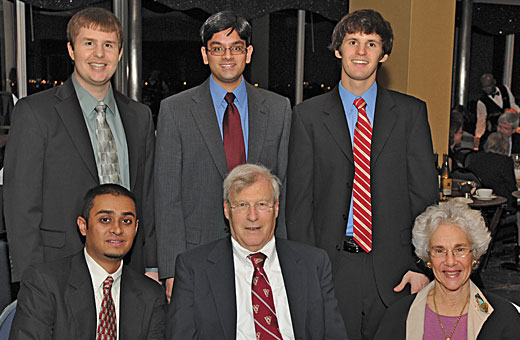
Scholarships make education more accessible to all students. ROBERT BOSTON

Scholarships make education more accessible to all students. ROBERT BOSTON
As co-chairs of the scholarship initiative committee and major donors to Washington University School of Medicine, Jay A. Kaiser, MD 72, and Gordon W. Philpott, MD 61, are as serious about attracting the best and brightest talent to the school as they are about helping medical students fulfill their dreams without the burden of enormous debt.
The two physicians, who both serve on the school’s National Council, share a commitment to today’s medical students and their chosen profession.
Jay A. Kaiser, MD 72:
A need to give back
Kaiser founded and is president of California Advanced Imaging Medical Associates located in the San Francisco Bay area.
But Kaiser, who remembers being a student fresh out of college who needed a leg up, came from much humbler beginnings.
“My father was a coal miner. I had no money,” he recalls. “To attend a medical school the quality of Washington University School of Medicine wouldn’t have been possible without scholarships and loans.”
Kaiser credits his professional success not only to his medical education, but also to the culture of excellence and constant learning that he internalized during his training in St. Louis.
“Everything I’ve achieved is due to the education I received at Washington University,” he says.
Because of that, Kaiser and his wife, Ronnie, began donating to the university when he entered private practice. They have a named endowed scholarship and contribute to the Class of 1972 scholarship fund.
“It’s important that people from all economic levels of our society have the opportunity to attend medical school,” he says. “Who better to understand that than physicians?”

Kyle G. Jacobsen, Class of 2014, center, with Ronnie and Jay A. Kaiser, MD 72
Gordon W. Philpott, MD 61: The fun of giving
Philpott, emeritus professor of surgery, has always felt the need to give back to the school where he received his education.
Shortly after becoming a faculty member, he convinced his mother to set up a scholarship fund for students. Since then, he’s set up an endowed scholarship, donated to annual scholarships and, with Kaiser, is leading the effort to bring in more money for medical students.
But there was one aspect of giving that Philpott never anticipated: how much enjoyment he would derive from getting to know the medical students.
“Creating and participating in these scholarships is not only a good thing to do, it’s actually fun,” he says. “It keeps us connected with the
students and the school.”
He and his wife, Susie, stay in touch with their scholars, both past and present. Current Philpott scholar Marshall C. Strother, a second-year medical
student, calls the couple “wonderful” and says he enjoys spending time with them.
The feeling is mutual.
“The students are so good; they’re bright and hard-working,” says Philpott. “We are proud to be part of the school’s ongoing scholarship efforts.”

Susie and Gordon W. Philpott, MD, with their students, from lower left: Salil H. Desai (Class of 2012), Douglas J. Dearth Jr. (Class of 2013), S. Hassan Akbari (Class of 2012), and Marshall C. Strother (Class of 2014)
Debt can limit career choices for physicians
Kaiser and Philpott view scholarships as a way to help young physicians avoid crushing debt, freeing them to make career choices based on their unique interests.
“The students ought to always be able to make a decision (about specialty) based on their heart,” Kaiser says. “If you want to train physicians to go into the less highly paid specialties, you have to support them.”
Philpott, who spent his career as a faculty member, worries that excessive debt load may prevent some talented individuals from pursuing careers in academic medicine, robbing the future of great teachers and investigators.
“Keeping people in the teaching and academic world is one of my personal aims,” says Philpott. “If students are in debt, they feel compelled to pick a field, such as the clinical option, that is more financially rewarding. I’m worried that teachers are going to be hard to find.”
Because cost has become such a critical factor in how students choose a medical school, scholarships help attract the very best students.
“Every student who is considering enrolling at Washington University School of Medicine has already shown a commitment to excellence and a desire to keep learning,” says Kaiser. “To continue to attract that high quality of student into the program, we need to support them.”